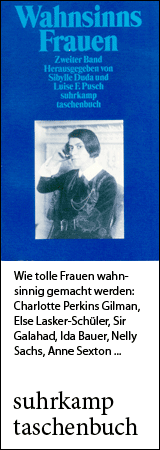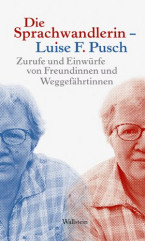
(Hedwig Baum [eigentlicher Name]; Hedwig Lert [Ehename]; Vicki Prels [Ehename]; Vicki Prels-Baum; Frau Lorl [Pseudonym]; auch andere Schreibweisen (Vicky, Wicki …))
Born 24 January 1888 in Vienna
Died 29 August 1960 in Hollywood/Los Angeles
Austrian-German-US-American author, harpist
55th anniversary of death August 29, 2015
Biography
Name variants: Hedwig Baum [real name]; Hedwig Lert [married name]; Vicki Prels [married name]; Vicki Prels-Baum; Frau Lorl [pseudonym]; other spellings of her first name (Vicky, Wicki …)
Introduction
In her memoir Es war alles ganz anders (1962; It Was All Quite Different, 1964), Vicki Baum ironically refers to herself as a “first-class writer of the second rank.” The best-selling author at the German publishing house Ullstein during the Weimar Republic (and later at Doubleday in the U.S.) was well aware of the high quality of her craft, but also disappointed that some of her works were not also acknowledged as “serious literature.” Made known the world over as the author of Menschen im Hotel (filmed in 1932 with Garbo and other stars as Grand Hotel), Baum never really transcended this early reputation despite dozens more novels over the course of her lifetime, and she was long dismissed or ignored as an author of “Trivialliteratur” (popular fiction). More recent scholarship, with its renewed interest in Weimar culture and in women’s literature, has begun to revise this view. Baum’s literary career is a fascinating case study for the interaction of literature, marketing and reception (K 44). Moreover, the story of her life and work in three different countries is an impressive example of energy, tenacity and an overwhelming drive to remain self-sufficient.
(The following sketch relies chiefly on the excellent new biography by Nicole Nottelmann, Die Karrieren der Vicki Baum. Eine Biographie [=N], as well as the article by Lynda King in the DLB [=K] and the essay by Katharina von Ankum. All are cited in the literature below. Translations from the German, including especially from Baum’s memoir, are my own.)
Viennese Childhood and Youth
Baum was the only child of well-to-do Jewish family in Vienna. Her childhood was marked by the illness of her depressed mother and the tyranny of her excentric, hypochondriac father. Her mother, Mathilde Donath, came from a wealthy family and had entered into a marriage of convenience with the businessman Hermann Baum. She suffered from the contemporary malady “hysteria” among other things and spent several months in the sanatorium in Inzersdorf (where “Anna O.” was also hospitalized). As a child Vicki longed for the love of her nervous, often absent and narcissistic mother and felt isolated and an outsider at school. Her father would have preferred to have had a son—he would have been called “Viktor”—and raised his daughter to be tough: she wasn’t allowed to cry and or have sweets, but was rewarded for good behavior or outstanding accomplishments with money. She learned this lesson well and was motivated her whole life to earn her own money. “Only conformity to the rules and achievement paid off in hard currency.” Later, in her somewhat subjective memoirs, she showed gratitude for this harsh upbringing, which she claimed had strengthened her character. The traumatic experiences of her childhood and youth would moreover also be an important source of her later creativity.
The Harpist
Baum’s mother wanted to prevent her daughter from having to lead a life of dependency like hers, and sent Vicki to preparatory courses in harp at the conservatory to become a professional musician. In 1907 Vicki made her début as a harpist in the “Concertverein” (the predecessor of the present-day Vienna Symphony); she was the only woman among 80 men. The young musician was soon appearing as a soloist at least once a week and was asked by Bruno Walter to perform in his Munich premier of Mahler’s Lied von der Erde in 1911.
Meanwhile her mother had been diagnosed with cancer, and Vicki had to attend to her between rehearsals and performances, since her anxiety-ridden father had fled the scene to his mother and sister’s. Mathilde finally gave up the struggle and died on March 31, 1908. Following this painful experience Vicki was often anxious, fearing that she herself might lose control and be drawn to suicide. But outwardly she tried from that point on to live with “strength, the will to live, competence, in short that ‘despite everything’ [that was] her own private ‘religion’; she followed it her whole life long” (N 40).
Two Marriages, One Short, One Long
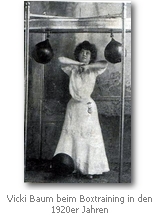
During this time Vicki Baum got to know the author and coffee-house litterateur Max Prels, whom she married in 1909, and for whom she took on writing tasks when he missed his deadlines. The harpist was discovering that she could write well under pressure. She won first prize in a contest sponsored by the Munich satirical journal Licht und Schatten; among the judges were Thomas Mann and Ludwig Thoma.
The marriage was basically over by 1911; the divorce came in 1913. Baum met the musician Richard Lert (originally Löw) through his sisters, who were taking harp lessons with her. Lert, who was second “Kapellmeister” (associate conductor) in Darmstadt at the time, invited her to audition for his orchestra; she played so brilliantly that she was offered a three-year contract on the spot. In 1914 she moved to Darmstadt, where she could now afford her own apartment, and began writing her second novel, Eingang zur Bühne (published 1920; translated as Once in Vienna, 1943). (She had written her first novel, Frühe Schatten [published 1914, Early Shadows], largely as therapy following the illness of her mother.)
She married Lert in 1916 and moved to Kiel with him, where he had his first senior position as director of the opera. She turned down an offer from Bruno Walter to play the harp in Munich, preferring to give up the hard work of a musician’s life and become a mother. Her son Wolfgang was born in the winter of 1917 amidst the most difficult wartime hardships. But Vicki Baum was happy nevertheless: like her own fictional characters to come, she had “found herself” in the act of giving birth more than in the sex-act. Her second son Johannes Peter was born in Hanover on 1 January 1921.
Hanover 1919 – (February) 1924: Writing, Dancing, Going Hungry
Vicki Baum wrote of her time in Hanover: “They were good years in spite of the daily, even hourly inflation and the intensified recurrence of hunger and cold” (B 328). She found the city “ugly and unappealing” (B 327), but at the same time, as the center of the avant-garde in art, music and dance, incredibly stimulating. “Art and life went hand in hand for the first time, it seemed to me; art was no longer merely an ornament of life but rather its immediate expression. Cubism, Futurism, Expressionism…, that’s what we were like, that was our world…. We lived in a new dimension, ourselves, even my friends and I” (B 329).
Richard Lert had accepted a position at the Prussian Court Theatre in Hanover in 1919 and soon caused a sensation with his modern productions of Händel’s operas, which he had “rediscovered” and introduced in Germany. Vicki now “officially” began her career as a writer by signing a contract with Ullstein for Eingang zur Bühne and three more novels. With her 12,000 Marks per month plus royalties she was once again independent and in fact contributed the biggest part of the family income. During the day she was a housewife and mother and Richard’s most valuable musical adviser. In the evening, when he was at the opera and their little boy was asleep, she had time for herself and wrote. Baum describes the Hanover years as a personal break-through: “In the first years after the war I had the feeling that I had entered a different country, one in which I was at home and happy. I had found myself; probably it was nothing other than that I had finally … become a grown-up…. At the same time I felt exhilarated by an unfamiliar sense of freedom, I could fly, dance.” (B 326)
Baum’s early works already show her characteristic strengths: “precise knowledge of a milieu,… sensitively drawn figures, skillful construction and a sure feeling for melodrama” (N 69). Eingang zur Bühne appeared in 1920 and was a great success, first as a serialized novel in the Vossische Zeitung, with a circulation of 80,000, and then in the series Gelbe Ullsteinbücher für eine Mark (Yellow Ullstein Books for One Mark). In the next eight years 146,000 copies were sold. In a similar way Baum’s further novels reached Weimar’s mass reading public, which sought entertainment above all else. With sophisticated cross-marketing the house of Ullstein advertised its books via serialized printing and reviews in its own multiple publications (e.g. in the Berliner Illustrierte Zeitung, which had a circulation of some one million copies per week). The publishing house was enthusiastic about its new author, whose second novel Die Tänze der Ina Raffay (1921; Ina Raffay’s Dances, republished in 1982 as Kein Platz für Tränen) was also a best-seller, and it tried to secure her with an exclusive contract.
Baum hesitated at first; she wanted to retain the freedom to publish elsewhere, to be a radically independent artist. Two aspects of her character were in conflict with each other: the bourgeois, security-seeking family-oriented side vs. the freedom-loving nomadic side. “But my nesting instincts exist … in open conflict with my totally opposite drive to be free and independent, without burden or ballast, a nomad, a gypsy.” (B 330-331)
Although she did not like revealing her private self and considered it to be “indulging in self-contemplation” (N 68), Baum nonetheless did this in her books, which often deal with her own experiences and conflicts in modified form. This is precisely what makes her earlier novels so interesting; we learn something about her romantic conflicts and marriage issues, the ups and downs of an artist’s life seen through her eyes. And in Ina Raffay she even anticipates her own behavior decades later: like Vicki Baum, the dancer dies of cancer without ever having revealed anything of her illness to her husband.
Die Tänze der Ina Raffay dealt with the new “Ausdruckstanz,” or modern dance, which was just then making a sensation in Hanover through its great exponent Mary Wigman. Although Baum did not meet the famous dancer until after the novel appeared, Wigman might easily have been the inspiration for Ina Raffay. Baum admired the “early feminist,” the first woman to dare to display her inner life so powerfully with expressive gestures (N 82-3). “Mary Wigman’s face was a powerful experience for me – the high cheekbones, the large mouth, the high, clear forehead, the drivenness in her expression, this trance, in which she received and executed her dance-ideas…. My entire being was fascinated by her. These were the dances I had once dreamed of.” (B 326-7).
The new dance was one of Vicki Baum’s most important experiences during her Hanover years. “What Gustav Mahler, Wagner, Ibsen … meant to me during my years of [intellectual and musical] awakening, Mary Wigman and her circle meant to me now with modern dance …” (B326). Vicki took lessons in modern dance herself – as she reports, for over ten years – and describes her first afternoon in the dance course: when she was “allowed to improvise at the end, to express what [she] wanted, [she] felt as though [she] hadn’t begun to live until that afternoon.” (B 330)
Vicki became friends with some of the gay dancers and later in life always had an especially close affinity for gay men. “I never quite figured out what I mean to them, but many of my nicest, most loyal, generous and amusing friends have belonged to this sexual no-man’s-land.” (B327)
It was in the “new dimension” of the art-city Hanover that Vicki wrote the two books that she considered her best, the novel about human isolation Ulle der Zwerg (1924; Ulle the Dwarf), and a collection of novellas, Die andern Tage (1922; The Other Days) (B329). Since she regarded them as more serious literature, she did not publish them with Ullstein, but with Deutsche Verlags-Anstalt in Stuttgart.
Baum also had to devote much time to the daily struggle to survive. “The biggest part of my time was spent on the hunt for food” (B 332). Once, during the days of revolution, she was underway with her two boys and their foraging sack and even landed in the line of fire of some snipers (B 333).
Mannheim 1924-25
In 1924 the family moved to Mannheim, where Richard Lert had been given the post of general music director. But Vicki did not like the city. “After the strong, brisk wind that blew in such stimulating fashion through the art- and theater scene of Hanover, and the feeling permeating everything that I was at home there in my own time, it seemed to me in Mannheim that I was being sent back to a past which had stood still, to the old bourgeois world I had fled long ago” (B 339). When Richard began to have conflicts with his colleagues and wanted to leave, Vicki remembered about the offer to work for the Ullstein publishing house in Berlin.
Berlin 1926–1931: The “happiest, most interesting and productive years…of my life.” (B353)
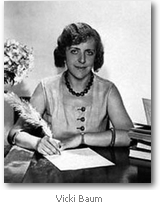
In Berlin Vicki Baum worked as an editor and author exclusively for Ullstein, by 1929 the largest publishing house in Europe. Richard Lert followed two years later, first as guest conductor, then as music director of the Staatsoper (national opera). Baum wrote and edited reviews, articles and stories for Ullstein’s various publications, such as Die Dame, Uhu (a monthly) and the Berliner Illustrierte Zeitung (BIZ). Between 1926 and 1932 five of Baum’s novels appeared first in serialized form in the BIZ. This raised the circulation of the paper to almost two million, and Baum became a star. At Ullstein and in Berlin she felt herself to be “at the center of the world” (B 367); here she helped shape the lifestyle of the Weimar Republic, both in her person and in her writing. As both a best-selling author and a mother, as an independent woman who dressed fashionably and was athletic (she took boxing lessons), Vicki Baum was a successful embodiment of Weimar’s “New Woman,” and was marketed as such by Ullstein.
Baum’s novel stud. chem Helene Willfüer (1928; transl. as Helene, 1932 and 1933), written in the then popular style of “Neue Sachlichkeit” or New Objectivity, tells the story of a young chemistry student who becomes pregnant unintentionally and tries without success to obtain an abortion. Despite her struggles as a single mother she becomes a recognized chemist and invents a miracle drug for rejuvenation. Baum’s presentation of a strong, independent “New Woman” is relativized by melodramatic elements and a traditional love-story. But it was perhaps just this combination that made the book so wildly popular. Its serialization in the BIZ raised the paper’s circulation by 200,000. The novel was filmed in 1929 with Olga Tschechowa as Helene. Baum herself became a celebrity in Germany and, like today’s superstars, even appeared in ads such as the one in the BIZ where she praises her Alpina watch, which helps her “stay in control of [her] time in spite of all [her] work.” (The advertisement is reprinted in K 42.)
With Menschen im Hotel: Ein Kolportageroman mit Hintergründen (1929; translated as Grand Hotel, 1930, 1931) Vicki Baum became an international celebrity as well. The book was brought to the stage in 1930 in Berlin and on Broadway, and filmed by MGM in 1932 with a star-studded cast (Greta Garbo, John and Lionel Barrymore, Joan Crawford). The novel was an immediate best-seller in England and in America as well as Germany, and was translated into at least 16 languages by 1936; it initiated a new genre, the hotel novel. The hotel, for Baum a symbol of modern society, is at the center of the action; various characters from different classes and backgrounds meet, interact with each other and then go their separate ways (K 47-8). Life in Baum’s metropolis is fast-paced and exciting, but also impersonal and fragmented.
America 1931-1960: New York, Hollywood, World Travels
When Grand Hotel became a Broadway hit, Vicki Baum traveled to America to take part in the advertising campaign of her New York publisher Doubleday. Here too she was celebrated as a star, and after a publicity tour around the country for several weeks finally arrived in Hollywood, where she was offered a long-term contract as film-script author. She returned briefly to Germany, but decided to remain permanently in the United States. Political developmemts in Germany were already making her uneasy, but she was also genuinely taken with the U.S. and wanted to raise her sons to become Americans.
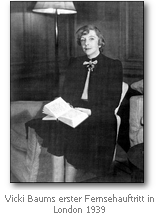
Although Baum particularly loved New York, the family settled in California in 1932 in the vicinity of Los Angeles and built a house in 1933 in Pacific Palisades (later resided in by Whoopi Goldberg). Richard Lert became conductor of the Pasadena City Orchestra. Vicki worked for the film industry till 1949, but was never as successful in this as one might have expected. She also wrote articles for magazines and continued to publish novels, which appeared on both continents. In the beginning she wrote in German, and when the Nazi regime banned her books in Germany they were published by the exile publisher Querido in Amsterdam. From 1941 on she began to write directly in English, since she was not always pleased with the quality of the translated versions. Baum, who acquired U.S. citizenship in 1938, began to be seen more and more as an American author of German origin. Like Marlene Dietrich, Baum helped emigrants from Hitler’s Germany and Austria (N 257).
In her subsequent books Baum varied the two general plot situations that had been so successful in stud. chem Helene Willfüer and Menschen im Hotel: at the center is either a female protagonist who must endure difficulties or a group of individuals who interact with each other during a 24-hour time span (K 51-52). She attempted to lend her novels more weight through precisely described details and historical context. In order to research her material she traveled around the world, for example to Egypt, Samoa or Bali, for Liebe und Tod auf Bali (1937; translated as A Tale of Bali, 1937). In Hotel Berlin ‘43 (1944) she dealt with National Socialism and tried to show that not all Germans were Nazis and that many were also victims of the regime. After the war she traveled again to Europe, but did not wish to return permanently to Germany or Austria, despite the fact that America during the McCarthy era was less and less attractive to her. In 1949 she toured France, italy, Marocco and Switzerland (but not Germany or Austria) with Carl Ostertag, a gay man twenty years her junior with whom she was infatuated for a time (N326).
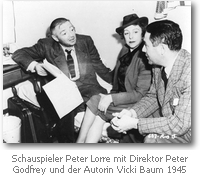
Vicki Baum was constantly torn between having to produce something popular quickly in order to earn money, and desiring to write a more “literary” book and be taken seriously as its author. Her attempts in this direction, such as The Weeping Wood (1943) or The Mustard Seed (1953), were barely acknowledged as such, however, so strongly had she been branded as a popular author of melodrama. Besides such disappointments, Baum’s weakening health made it ever more difficult for her to write during her later years. Most serious was a gradually worsening leukemia, which she concealed from her family till the very end and to which she succumbed on June 29, 1960.
For additional information please consult the German version.
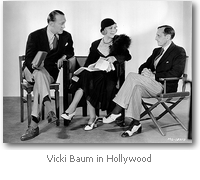
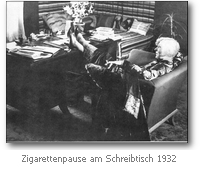
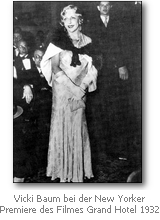
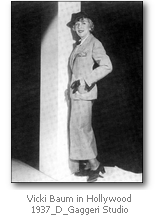
Author: Joey Horsley
If you hold the rights to one or more of the images on this page and object to its/their appearance here, please contact Fembio.


